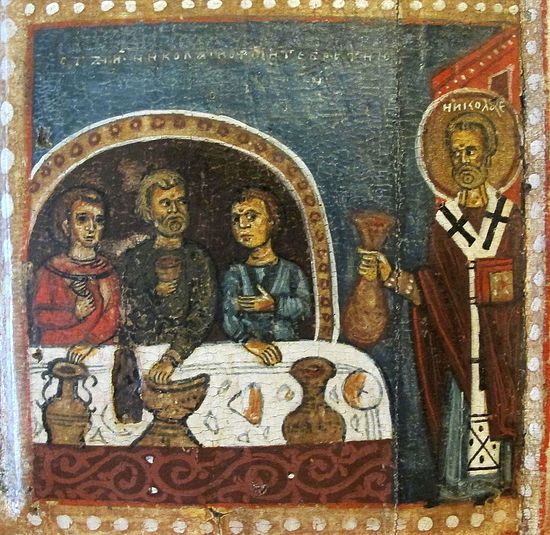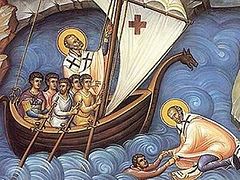Blessed are the merciful, for they shall obtain mercy
Matthew 5:7
What great reward does the Lord Jesus Christ promise to the merciful? About what holy virtue is the Savior speaking in these words?
This virtue of love and mercy in all its beauty and power is personified, my dear ones, by the one whom our faithful, pious hearts glorify today: the “feeder of orphans,” consoler of the sorrowing, intercessor in prayer for all who seek God’s help and mercy—St. Nicholas the Wonderworker. In the glory of his love he shines in the Church’s heavens, and the light of this glory covers the whole earth.
The virtue of mercy is the highest of many. Whoever fulfills Christ’s commandment of love and mercy fulfills the entire Christian law. This is not our own, human thinking. It is the teaching of God’s word.
The holy apostle Paul says, Though I speak with the tongues of men and of angels, and have not charity, I am become as sounding brass, or a tinkling cymbal. And though I bestow all my goods to feed the poor, and though I give my body to be burned, and have not charity, it profiteth me nothing (1 Cor. 13:1, 3).
And what wondrous fruits does this holiest and greatest of virtues, promised to us by our Lord and Savior, bring!
During the course of our earthly life we turn to the Lord with requests and pleas for forgiveness of our sins. We want our sins to be redeemed, as we weep and repent of them. The word of God teaches us to redeem our sins through charity (see: Dan. 4:24; Wisdom of Solomon 10:12; Is. 1:17-18).
Do you see, my dears ones, that through works of charity, the virtue of mercy, and fruits of love we can redeem our sinful falls for which we repent before the face of our Heavenly Father. What a consolation this is for our sinful hearts!
It would be a great happiness for us if God’s mercy would descend upon our whole lives and all our labors. Then, do works of love and mercy! The word of God tells us: But this I say, He which soweth sparingly shall reap also sparingly; and he which soweth bountifully shall reap also bountifully (2 Cor. 9:6).
Do you want to receive God’s mercy at the Last and Terrible Judgment of Christ? Adorn your soul with works of mercy. The Lord will say at His Last Judgment: For I was an hungred, and ye gave me meat: I was thirsty, and ye gave me drink: I was a stranger, and ye took me in: Naked, and ye clothed me: I was sick, and ye visited me: I was in prison, and ye came unto me. And the King shall answer and say unto them, Verily I say unto you, Inasmuch as ye have done it unto one of the least of these my brethren, ye have done it unto me (Mt. 25:35-36, 40).
Do you strive to have God’s blessing upon your children, your descendants, so that the Lord would not deprive you and your family of His divine care? Be compassionate and merciful. In the Scriptures the holy prophet says: I have not seen the righteous man forsaken, nor his seed begging bread. All the day long the righteous showeth mercy, and lendeth, and his seed shall be unto blessing (Ps. 36:25-26).
In sowing the seeds of love and mercy all around us, we as if obligate the Lord to give His mercy to us. What we give to the pauper, the hungry, the needy; what we do for the suffering and the weeping to console them draws God’s blessing to us. It is said in the scripture: He that has pity on the poor lends to the Lord... (Prov. 19:17). And the Lord always generously bestows His Fatherly rewards.
Who does not want that in days of sorrow, sickness, and trials the Lord would be merciful to us, that He would see our sorrows and sighing with His loving, fatherly gaze? To this leads the path of mercy. Scripture says: Blessed is the man that hath understanding for the poor man and the pauper; in an evil day the Lord will deliver him. May the Lord keep him, and make him to live… May the Lord help him on his bed of pain (Ps. 40:1-4)
These are the fruits of this virtue, this holy commandment of our Christian law of love and mercy, given to all of us for steadfast fulfillment during our Lord and Savior’s earthly life!
Our Lord, in Whom we believe, is called in Scripture God the Father of orphans and the poor. And how better can we earn the good will of our Heavenly Father than by our mercy to the poor, wretched, weeping, sorrowing, and to all who need and thirst for compassion, consolation, and help from us?
But whoever offends the poor and wretched who ask for compassion, whoever shuts his heart against his brother’s woe, offends the Lord God Himself in the person of his lesser brother. And what could a cruel person ask of his Lord God? What mercies could the one who shows no mercy, who shows no love and mercy to his brother, expect?
He would stand in prayer, begin to ask the Lord for mercy, and the one he pushed away would be as if standing there next to him. And that one who he rejected would say to the Lord, “Do not give him mercy, for he did not show any mercy to me.”
And if a cruel person, a person who has no compassion would ask the Lord for mercy in his moments of sorrow and trial, the Lord would answer him with His divine words: For he shall have judgment without mercy, that hath shewed no mercy (Js. 2:13).
If the Lord allows that the poor, the weeping, the sorrowing, the hungry, and the despondent be on the earth, then this is not only to test the patience and love of God of those whom He has visited with these trials, but also in order to incline our heart to deeds of love and mercy.
That is why the poor knock at your door—so that you might redeem your sins through charity. And that is why you meet along your way the weeping and sorrowing, the sick who seek some manifestation of your love, brotherly love and mercy—so that you might fulfill the divine commandment of our Lord Jesus Christ.
But we, my dear ones, should not only not let pass a single opportunity to help one who is waiting for spiritual or bodily help from us, but we should also seek out such opportunities, so that our hearts might be enriched by works of kindness, so that our lives would shine with them, according to Christ’s word: Let your light so shine before men, that they may see your good works, and glorify your Father which is in heaven (Mt. 5:16).
Through the small we acquire the great. Through the temporal we acquire the eternal.
Through the corruptible we acquire the incorruptible.
For works of love and mercy the Lord promises the merciful the greatest reward that a Christian soul can receive—mercy. After all, He is always faithful to His divine word: Blessed are the merciful, for they shall obtain mercy.
And, my dear ones, in the person of the great holy hierarch and wonderworker Nicholas—on whose holy name we today, the day of his feast, with special feelings of reverence, call with the whole Orthodox Church, which honors this exceedingly great and most holy saint—we have such a clear example, such a fragrant heavenly, spiritual example of love and mercy!
His entire earthly life was woven from works of love. And his life after death, where he lives in the Kingdom of eternal glory, is dedicated to this spiritual labor of service to people; for there is no soul that sighs before him that has not found a response in his loving heart. Every Orthodox soul knows countless confirmations of this.
May each of us who seeks the way to eternal salvation be inspired by his holy mercies and his holy example!
May each of our lives become richer from day to day with those works of kindness that draw the Heavenly Father’s loving gaze, that make up the adornment of human life! These works bring us sinners priceless happiness, and a joy that cannot be compared with anything earthly or quickly passing, but an eternal joy—to obtain the Lord’s mercy, and to delight to endless ages in the joy of eternal communion with Him.
Through the prayers of St. Nicholas, may the Lord grant all of us this joy!




